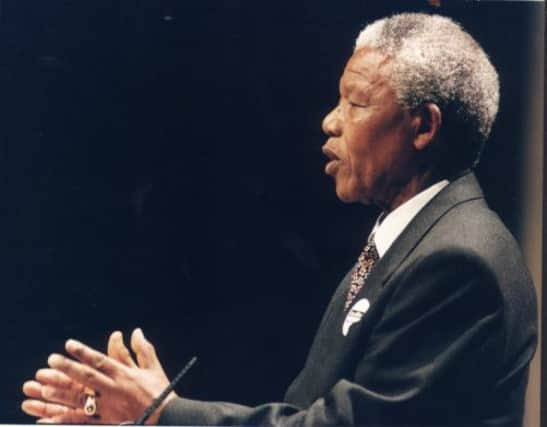Nelson Mandela: Loss of a Nation’s inspiration


Now, in the wake of his death, it is again in the global spotlight. It is a time not just for grief and gratitude, but also a clear-eyed assessment of what happens next in a country where one man was a guide and comfort to so many.
“It’s a new beginning,” said Kyle Redford, one of many outside the home of Mandela. “The loss of a legend is going to force us to come together once again.”
Advertisement
Hide AdAdvertisement
Hide AdHe acknowledged that there is a “sense of what next: Where do we go? What do we do? And how do we do it?”
Mandela’s resolve rubbed off on many of his compatriots, though such conviction is tempered by the reality that his vision of a “rainbow nation” failed, almost inevitably, to meet the heady expectations propelling the country two decades ago. Peaceful elections and relatively harmonious race relations define today’s South Africa; so do crime, corruption and economic inequality.
Mandela remained a powerful symbol in the hopeful, uncharted period after apartheid, even when he left the presidency and retired from public life. He became a moral anchor, so entwined with the national identity that some jittery South Africans wondered whether the country would slide into chaos after his death.
“Does it spell doomsday and disaster for us?” Archbishop Desmond Tutu asked rhetorically on Friday, before declaring that no, the country will not disintegrate.
“The sun will rise tomorrow and the next day and the next,” said Tutu, who like Mandela won the Nobel Peace Prize for fighting apartheid and promoting reconciliation. “It may not appear as bright as yesterday, but life will carry on.”
A series of violent events since last year intensified worries over the state of the nation. The August 2012 shooting deaths of 34 striking miners by police at the Marikana platinum mine recalled, for some South Africans, state killings under apartheid. In February, a Mozambican taxi driver was dragged from a South African police vehicle and later died in a jail cell.
At the same time, tourism surged. Despite labour strife and credit-rating downgrades, resource-rich South Africa hosted Brazil, Russia, India and China at the “BRICS” summit in March. It has the biggest economy in Africa and aspires to continental leadership.
Mandela’s death will not destabilise race relations in the country, contrary to some fears, according to the South African Institute of Race Relations.
Advertisement
Hide AdAdvertisement
Hide Ad“For many years now, South Africans have got along with one another largely peacefully without Mandela having been active in the political sphere,” Lerato Moloi, the institute’s head of research, said. “In fact, Mandela’s passing may be cause for many to reflect on the remarkably peaceful and swift racial integration of many parts of society.”
President Jacob Zuma evoked the idea of the 95-year-old Mandela, also known by his clan name Madiba, as a beacon for the ages when he announced his death on Thursday night.
South Africans, Zuma said, must be determined “to live as Madiba has lived, to strive as Madiba has strived and to not rest until we have realised his vision of a truly united South Africa, a peaceful and prosperous Africa, and a better world”.
Mandela admitted to weakness and failings, yet rose to greatness in a way that no contemporary or successor could match. Zuma, for example, has credentials as an anti-apartheid activist who was imprisoned with Mandela. But he and the ruling African National Congress, once led by Mandela, have been dogged by corruption allegations that have eroded support for the government.
The scene outside Mandela’s house yesterday embodied the mixed picture in South Africa, where political sparring between the ruling party and the opposition has sharpened ahead of national elections next year, the 20th anniversary of the pivotal vote in which Mandela became president.
Mourners outside the home mingled in an inclusive, celebratory atmosphere that prompted the Reverend Inigo Alvarez, a Catholic priest, to declare: “Now we experience what is South Africa, all kinds of people, all kinds of regions.”